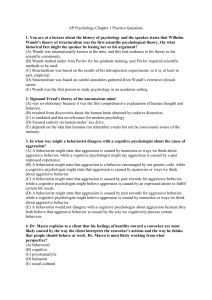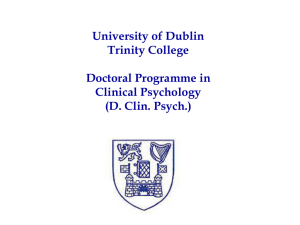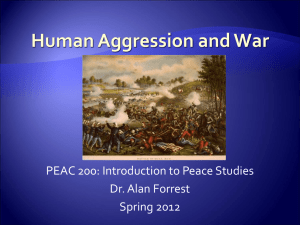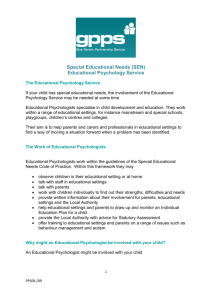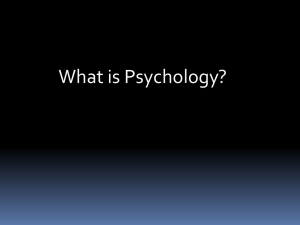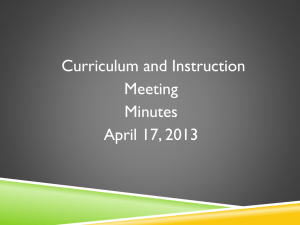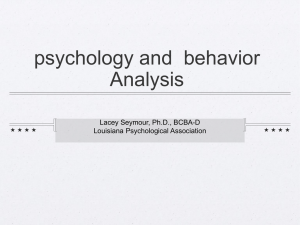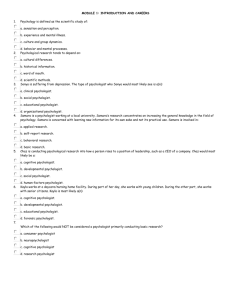AP Psychology Chapter 1: History of Psychology
advertisement
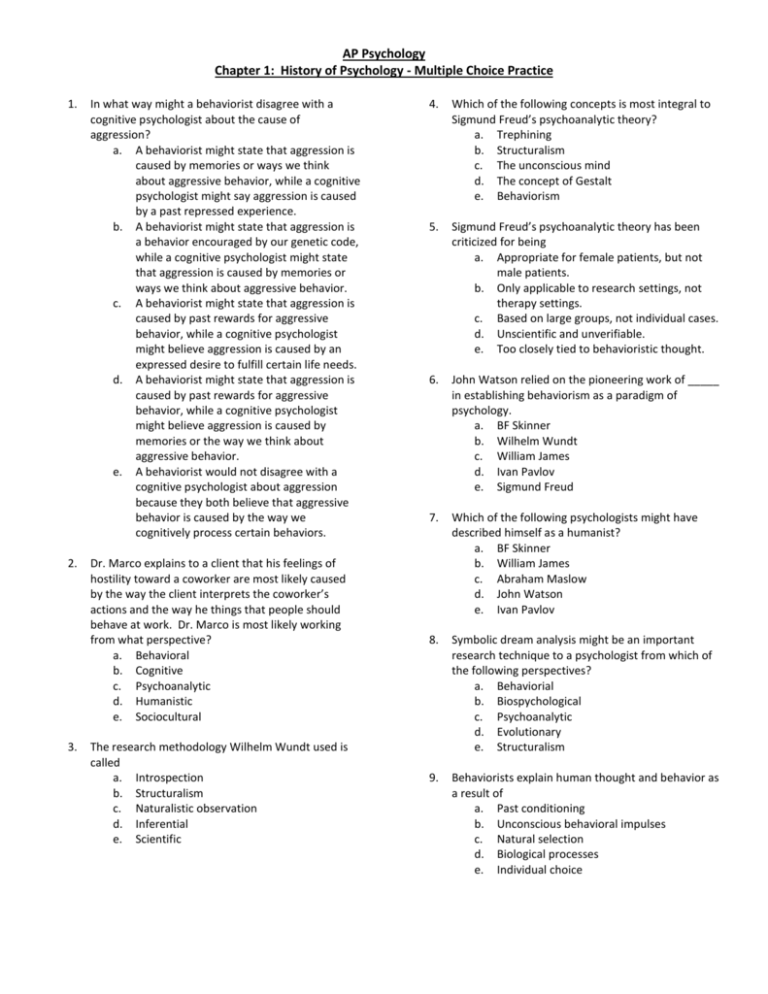
AP Psychology Chapter 1: History of Psychology - Multiple Choice Practice 1. 2. 3. In what way might a behaviorist disagree with a cognitive psychologist about the cause of aggression? a. A behaviorist might state that aggression is caused by memories or ways we think about aggressive behavior, while a cognitive psychologist might say aggression is caused by a past repressed experience. b. A behaviorist might state that aggression is a behavior encouraged by our genetic code, while a cognitive psychologist might state that aggression is caused by memories or ways we think about aggressive behavior. c. A behaviorist might state that aggression is caused by past rewards for aggressive behavior, while a cognitive psychologist might believe aggression is caused by an expressed desire to fulfill certain life needs. d. A behaviorist might state that aggression is caused by past rewards for aggressive behavior, while a cognitive psychologist might believe aggression is caused by memories or the way we think about aggressive behavior. e. A behaviorist would not disagree with a cognitive psychologist about aggression because they both believe that aggressive behavior is caused by the way we cognitively process certain behaviors. Dr. Marco explains to a client that his feelings of hostility toward a coworker are most likely caused by the way the client interprets the coworker’s actions and the way he things that people should behave at work. Dr. Marco is most likely working from what perspective? a. Behavioral b. Cognitive c. Psychoanalytic d. Humanistic e. Sociocultural The research methodology Wilhelm Wundt used is called a. Introspection b. Structuralism c. Naturalistic observation d. Inferential e. Scientific 4. Which of the following concepts is most integral to Sigmund Freud’s psychoanalytic theory? a. Trephining b. Structuralism c. The unconscious mind d. The concept of Gestalt e. Behaviorism 5. Sigmund Freud’s psychoanalytic theory has been criticized for being a. Appropriate for female patients, but not male patients. b. Only applicable to research settings, not therapy settings. c. Based on large groups, not individual cases. d. Unscientific and unverifiable. e. Too closely tied to behavioristic thought. 6. John Watson relied on the pioneering work of _____ in establishing behaviorism as a paradigm of psychology. a. BF Skinner b. Wilhelm Wundt c. William James d. Ivan Pavlov e. Sigmund Freud 7. Which of the following psychologists might have described himself as a humanist? a. BF Skinner b. William James c. Abraham Maslow d. John Watson e. Ivan Pavlov 8. Symbolic dream analysis might be an important research technique to a psychologist from which of the following perspectives? a. Behaviorial b. Biospychological c. Psychoanalytic d. Evolutionary e. Structuralism 9. Behaviorists explain human thought and behavior as a result of a. Past conditioning b. Unconscious behavioral impulses c. Natural selection d. Biological processes e. Individual choice 10. A therapist says that she uses whatever psychological perspective “works best” for each patient might be best described as a. Sociocultural b. Humanistic c. Eclectic d. Psychoanalytic e. Functionalist 13. If Aristotle and Locke, who both believed that what we know is acquired from experience, were alive today, they would best agree with the a. Behavioral approach b. Psychoanalytic approach c. Humanistic approach d. Biological approach e. Cognitive approach 11. Wilhelm Wundt and the structuralists studied questions still asked today primarily by a. Behavioral psychologists b. Cognitive psychologists c. Psychodynamic psychologists d. Humanistic psychologists e. Sociocultural psychologists 14. Which psychological approach is most concerned with the importance of encoding, storing and retrieving information? a. Information psychology b. Behavioral approach c. Psychodynamic approach d. Biological approach e. Cognitive approach 12. With which definition of psychology would John Watson and BF Skinner most agree? a. Psychology is the science of behavior. b. Psychology is the science of mental processes. c. Psychology is the science of behavior and mental processes. d. Psychology is the science of behavior and mental processes specific to contexts. e. Psychology is the science of the brain and nervous system. 15. Dr. Didden was hired by the TLC Company to help them retain their employees without lowering the firm’s profits. After TLC removed cubicles and permitted employees to decorate their workroom as recommended by Dr. Didden, the absentee rate declined and no employees left for jobs elsewhere. Dr. Didden is most likely a. A forensic psychologist b. An industrial/organizational psychologist c. A counseling psychologist d. A clinical psychologist e. An engineering psychologist

